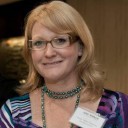Steph Allie Heckman, executive director of One World Children’s Fund, recently presented at the International Human Rights Funders Group (IHRFG) conference in San Francisco with One World Champion of Crea+ in Brazil, and founder of Liibook.com, Regina Ponce, and founder and executive director of African Diaspora Network, Almaz Negash.Their session focused on ‘Redefining Philanthropy to include the Diaspora’.They recently took some time to sit down and reflect on the key points from the two days.
Steph During the conference, I found myself reflecting on one issue in particular. In working to protect human rights we must ensure we respect human rights. This is especially pertinent when we are discussing actions from a funders’ perspective.
With money, there is always an agenda and a power dynamic. Combine this with activism and you could easily become a voice of disempowerment in the human rights environment.
If funders have a vision to empower communities and individuals then we must look at who is making the decisions around funding. As Diana Samarasan from Disability Rights Fund clearly stated, ‘Nothing about us, without us.’
I especially appreciated the discussion around participatory grantmaking. Human rights grantmakers are at the forefront of inclusive, peer-to-peer decision making, and I think the philanthropic sector can learn much from their example.
The session highlighted participatory decision-making processes such as: including board and advisory council members from the grantee community, peer-to-peer review structures, grantee recommendations for new grantees, and building long-term partnerships with grantees. Change takes time and there need to be respectful relationships that are built on trust between all stakeholders.
Over the coming months, the leadership team at One World will look at how we make decisions. Is there something we can learn to help us grow and build a stronger global community? Actions that will help grassroots leaders better serve the children in their communities? Actions that will help us leverage more revenue for our partners? This is, after all why One World Children’s Fund exists.
Regina Brazilian diaspora communities around the globe have been some of the most committed philanthropists in the world. In 2004, the Inter-American Development Bank (BID) revealed that the Brazilian global diaspora (US/Europe/Japan) sent US$5.6 billion back to the country, which represented 1 per cent of Brazil’s Gross Domestic Product (PIB/GDP). Overall, these funds decrease poverty, help families acquire homes and, very importantly, contribute to non-profit organizations.
I believe when grantmakers support members of the diaspora, who are already engaged with social change makers in the country, they are supporting philanthropists who are in a perfect position to develop grassroots organizations.
When I look at my work with Crea+, I see the fundraising success (increased by 150per cent annually), but I also see the opportunities to leverage first world resources (marketing, new technologies and philanthropy trends) and localize them to Brazil. Furthermore, as a Champion, I can compensate for fluctuating in-country donations, usually the downside of a local cultural bias that says, ‘Brazilians already pay high taxes; thus, it’s the job of the government to take care of the poor.’ With the help of grantmakers, we can solidify even further the role that NGOs can play in expanding Brazil’s civil society.
I think that for some strange reason the diaspora’s social leaders are invisible to grantmakers and have not been perceived as philanthropists. Many perceive diaspora communities as comprising people who left their country and want nothing to do with it. Obviously, plenty of available data shows the opposite.
Ultimately, I feel the diaspora should be part of the decision-making process that determines where funds go. I believe it is imperative we capitalize on the power of community leaders from the diaspora as they develop philanthropy in their country of origin.
Almaz As my colleague Regina expresses, the diaspora is already emotionally and financially connected to their home countries. Hence, they bring a very unique perspective on what to give, for what, to whom, and why. We must unite grantmakers and diaspora priorities and shed light on the kinds of organizations on which to focus grants. The diaspora can also provide critical help in keeping grantees accountable and ensuring that funds are appropriately used.
We need to align the two efforts – grantmaking and diaspora giving. Currently, the diaspora is not involved in the grantmakers’ work. We are not part of the discussion and a lot of opportunity is missed because of this. As we move forward, I would like to identify three areas which could unite efforts across the diaspora and grantmakers:
- Outcome-based funding The diaspora can work with foundations to provide guidance and support to fund projects that are based on outcomes rather than simple, numerical outputs.
- Measuring impact Diaspora can help (in-country and/or outside country) in providing guidance to ensure that funds are used for what they are intended and that the outcome is measured.
- Participatory grantmaking Establish diverse teams of decision makers which include the diaspora.
Finally, we must see this as a long term partnership across all sectors. It is more than recruiting an individual from the diaspora to sit on your board or join your staff; or approaching diaspora communities and asking for funding for your agenda. We must be in this for the long term, build partnerships based on trust, and engage with stakeholders at all levels. After all, we are united in our vision to get people out of poverty, and to empower communities and individuals to promote and protect their rights.
Steph Allie Heckman is executive director of One World Children’s Fund.
Regina Ponce is the founder of Liibook.com.
Almaz Negash is founder and executive director of African Diaspora Network.






Comments (0)